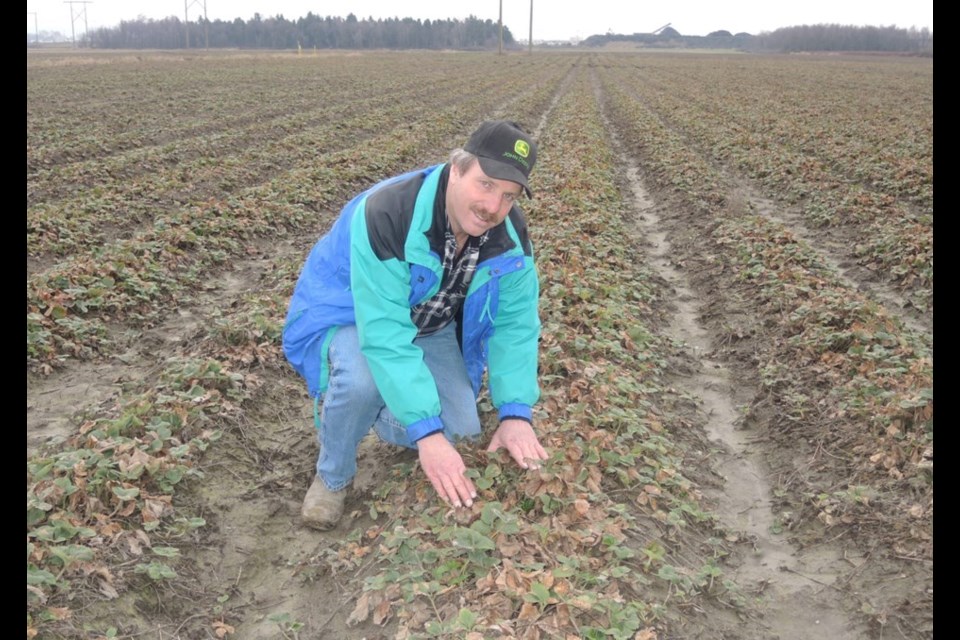If you think fresh produce is expensive right now in B.C., just wait to this summer and fall.
That’s the stark warning from one of Richmond’s most prominent farmers, Bill Zylmans, owner/operator of W&A Farms, with around 250 acres of mainly potato and strawberry fields.
Russia’s top export to Canada in 2021 was fertilizer, and with Canada slapping trade sanctions on Russia, it has caused a massive spike in the cost of fertilizer, which was already on the rise.
Throw in the soaring fuel costs – due also, in part, to Russia’s invasion of Ukraine – and local farmers are having to re-think their spring planting strategy.
What it could mean, said Zylmans, is farmers planting and/or harvesting less crops, causing prices to rise even more for people looking for local produce from May through to October.
Fertilizer cost about to double for farmers
“My suppliers are telling me right now that, when I start planting May 1 for the fall, my fertilizer costs are going to be double what they were last year,” Zylmans told the Richmond News.
“I’m like, ‘well, thanks for telling me. Holy crap.’ You do a budget, you do a business plan, and you borrow money - if you need to - you put in a crop.
“But look at the gasoline and diesel prices, how much of that did we foresee?
“Fertilizer is going to double. Diesel is up 35 per cent. Other ingredients are up 50 per cent. Labour is going up again in June.
“Plastics or any other materials needed for bringing something to market, be it strawberries, cucumber or potato, everything is going up dramatically.
“At the end of the day, the consumer is going to have to pay more.”
Farmer hoping to keep costs as low as possible for consumers this summer
Zylmans said he didn’t want it to sound like farmers such are pleading poverty and he did temper the soaring costs by saying he hoped he wouldn’t have to put prices up too much.
“You’re gonna pay more. I’m not going to say a lot. I have to be realistic. We need food,” said Zylmans, who, amongst other things, is also the chair of the Canadian Potato Council.
“If there’s one thing that we farmers struggle with is, ‘can the consumer afford that?’
“But it is a perishable product. If I have to go to the bank after a loss and ask for money, there’s not much sympathy, there’s no handouts there.
“You’ve just got to take your best judgement call and roll with it.”
Richmond organic farmer not feeling impact, not surprised by spiralling costs
At the opposite end of the spectrum, however, the cost clouds forming over the heads of conventional farmers, such as Zylmans, haven’t darkened the door of one local organic farmer, who has yet to feel the full impact of the global supply spike.
Kimi Hendess, who runs Sweet Digz Farm at the south end of No. 2 Road with her partner Kareno Hawbolt, pointed out that’s because their main cost is the old-fashioned blood, sweat and tears – aka labour.
It’s expensive to hire local labour, added Hendess, but that, by default or design, means the farm uses less fuel and the large-scale fertilizer employed by their conventional counterparts.
“We’ve been seeing this happening for years because of climate change,” Hendess told the News.
“Because we’re small, we have very small tractors. They’re walk-behind, 18 horse-power tractors, so we don’t go through as much fuel.
“We’re a much more bio-intensive production, in a smaller space, so our fuel use is a lot lower and we do a lot more by hand. That’s our versatility.”
Hendess said the cost for their plant-based compost has went up significantly, but that’s only because they have to get it delivered from Abbotsford, as opposed to picking it up locally and the now-closed composting facility in east Richmond.
The intensive labour element is the “predominant reason why organic is more expensive,” added Hendess, pointing out that their “customers are used to paying that; because they’re used to certain values, healthier choices etc.”
Conventional farm produce may cost as much as organic this season
Hendess agreed that, what it may boil down to, is a levelling of the playing field, when it comes to the price discrepancy between organic and conventional produce.
“This is exactly what we’ve known all along. We’ve noticed it,” she said, noting that Sweet Digz also uses bikes for half of its deliveries, saving further on fuel costs.
“Our model is more sustainable and it’s going to start revealing itself that organic is more economically sustainable.”



